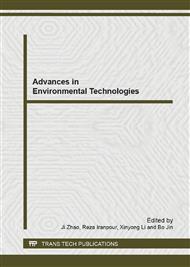p.2622
p.2629
p.2636
p.2641
p.2645
p.2651
p.2655
p.2665
p.2670
Cooperative Game Analysis on Wastes Recycling from Industrial Zones
Abstract:
Based on cooperative game theory, this paper, after taking government subsidy into consideration, analyzes, from the two aspects of waste collection cost and disposal cost, the cooperative game relation between manufacturers and resource recovery companies in the process of recycling of industrial zone wastes as well as the important role that government plays in the recycling cooperation mechanism established between the two sides. After calculation of payoff matrix, it is found out that the difference between manufacturers self-disposal cost and entrusted disposal cost, resource recovery companys waste recovery cost and disposal cost, and government subsidy are the key factors that decide whether the two sides will cooperate with each other. Finally, the paper proposes the measures that will facilitate the cooperation of the two sides, which is of certain guiding significance to build an eco-friendly supply chain and boost the development of circular economy.
Info:
Periodical:
Pages:
2645-2650
Citation:
Online since:
August 2013
Authors:
Price:
Сopyright:
© 2013 Trans Tech Publications Ltd. All Rights Reserved
Share:
Citation:


